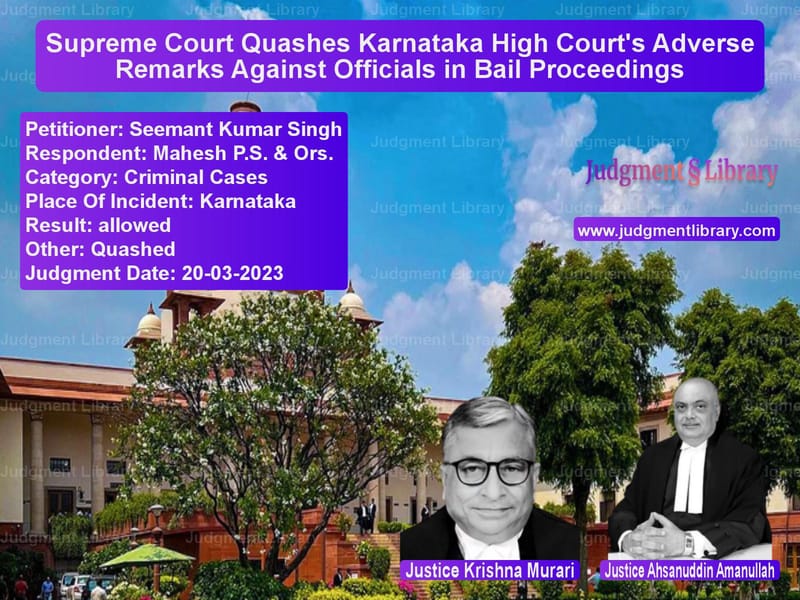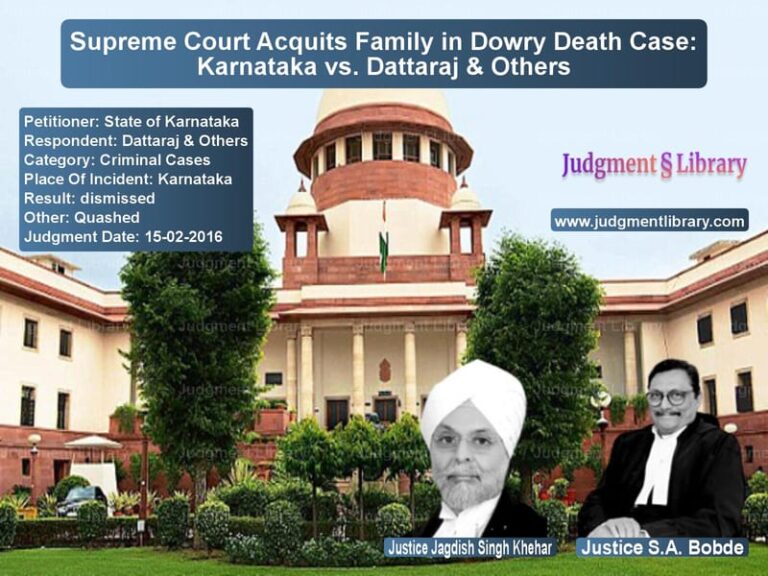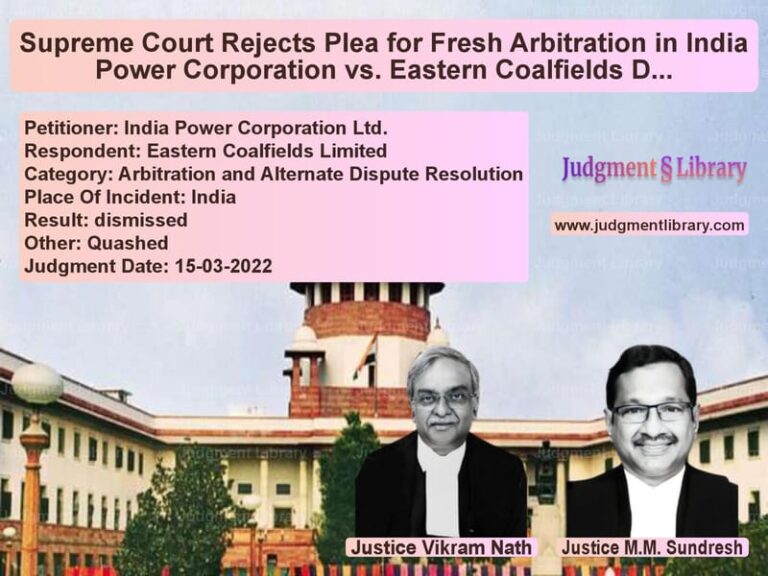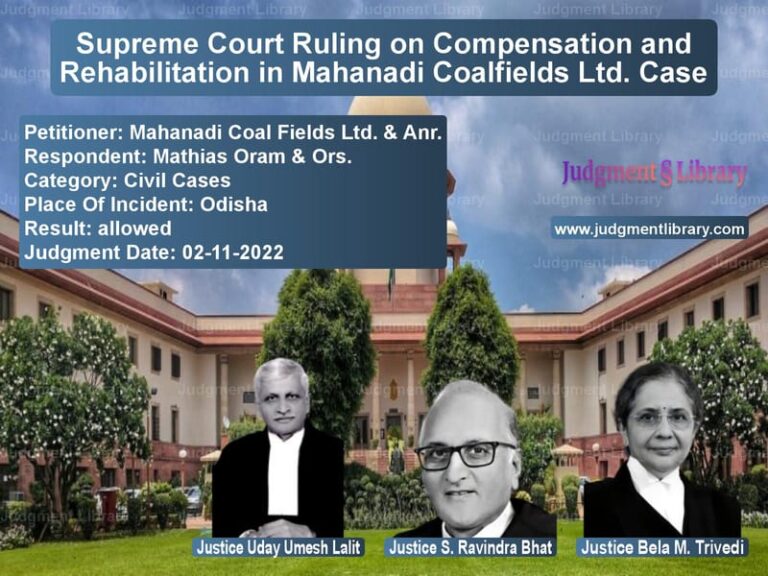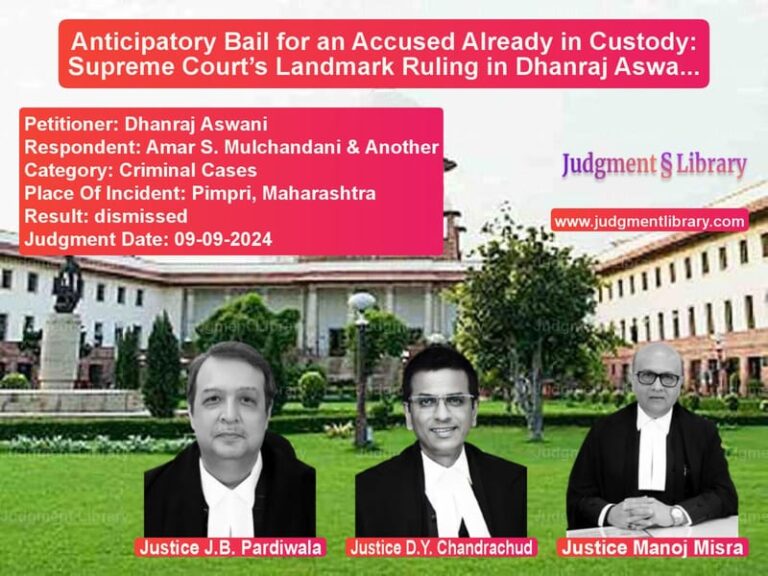Supreme Court Quashes Karnataka High Court’s Adverse Remarks Against Officials in Bail Proceedings
The Supreme Court of India recently delivered a significant ruling in Seemant Kumar Singh v. Mahesh P.S. & Ors., where it quashed adverse remarks made by the Karnataka High Court against government officials in a bail proceeding. The judgment highlights the importance of judicial restraint, fair hearings, and the limited scope of bail proceedings.
Background of the Case
The case arose when the Karnataka High Court, during the bail proceedings of a police officer accused of bribery, made adverse remarks against senior government officials who were not parties to the bail application. The officials affected by these remarks included:
- Seemant Kumar Singh – Additional Director General of Police (Anti-Corruption Bureau).
- J. Manjunath – District Collector, Bangalore.
- The State of Karnataka – Represented in its official capacity.
The High Court, in its interim order dated July 7, 2022, not only made derogatory remarks about these officials but also directed the Central Bureau of Investigation (CBI) to investigate one of them. These remarks were made despite the fact that the officials had no connection with the bail proceedings.
Legal Issues Considered
- Whether the Karnataka High Court’s adverse remarks against the appellants were justified in the absence of their involvement in the case.
- Whether the High Court exceeded its jurisdiction by directing the CBI to investigate an official without due process.
- Whether such remarks, made in open court and broadcasted publicly, had caused reputational harm to the appellants.
Arguments of the Parties
Petitioners’ Arguments (Seemant Kumar Singh, J. Manjunath, and the State of Karnataka)
- The petitioners argued that they had no connection with the bail proceedings of the accused officer, and yet, the High Court made adverse remarks that were widely reported in the media.
- The High Court’s direction to the CBI to investigate one of the appellants was made without hearing them or giving them an opportunity to defend themselves.
- The remarks caused significant damage to their reputations, as they were broadcasted on the High Court’s YouTube channel and subsequently picked up by news agencies.
- Judicial propriety requires that courts exercise caution while making observations that could harm an individual’s professional standing.
Respondents’ Arguments (Mahesh P.S. & Ors.)
- The respondents contended that the High Court’s remarks were incidental and made in the interest of ensuring accountability.
- They argued that the court had the discretion to call for investigative reports if it believed that certain officials might be involved in wrongdoing.
- They further stated that if the officials had no reason to fear scrutiny, they should have no objection to an investigation.
Key Observations of the Supreme Court
The Supreme Court ruled in favor of the appellants, making the following key observations:
- Scope of Bail Proceedings: The Court held that bail proceedings are limited to assessing whether an accused person should be granted bail, and extraneous issues should not be discussed.
- Judicial Restraint in Making Adverse Remarks: The Court reiterated that judges must exercise caution while making remarks that could damage an individual’s reputation, especially when the concerned individuals are not parties to the case.
- Violation of Natural Justice: The Court observed that the High Court’s remarks and directives against the appellants were made without giving them an opportunity to be heard, violating the principles of natural justice.
- Impact of Public Broadcasting: The Court noted that the live-streaming of judicial proceedings has increased transparency but also heightened the responsibility of courts to ensure that remarks made in passing do not cause unnecessary harm.
Key Judgment Excerpts
The Supreme Court, citing earlier precedents, observed:
“Judges should not use strong and disparaging language unless it is absolutely necessary for the decision of the case. Strictures against individuals must be passed only when they are a necessary part of the judicial determination.”
Further, the Court held:
“Bail proceedings do not provide a forum to initiate collateral inquiries into individuals not connected to the case. Any such direction issued without hearing the affected persons must be quashed.”
Final Judgment
Based on these findings, the Supreme Court:
- Quashed the Karnataka High Court’s adverse remarks against the appellants.
- Set aside the direction issued by the High Court to the CBI to investigate one of the appellants.
- Directed that the High Court, in future, must exercise caution while making remarks that could have reputational consequences.
Accordingly, the Supreme Court allowed the appeal and ruled in favor of the appellants.
Implications of the Judgment
The ruling has significant implications for judicial proceedings and administrative governance:
- Ensures Judicial Accountability: The judgment reiterates that courts must remain within their jurisdiction and avoid making unnecessary observations.
- Prevents Reputational Harm: The decision emphasizes that judicial remarks should be made with caution, especially when live-streamed and widely reported.
- Reaffirms Natural Justice: The ruling strengthens the principle that no individual should be condemned without being given an opportunity to defend themselves.
- Limits the Scope of Bail Hearings: The judgment clarifies that bail proceedings should not be used to initiate broader inquiries unrelated to the case at hand.
Conclusion
The Supreme Court’s ruling in Seemant Kumar Singh v. Mahesh P.S. & Ors. is a landmark decision that underscores the need for judicial restraint and adherence to due process. By quashing the Karnataka High Court’s adverse remarks and setting aside the directive to the CBI, the Court has reinforced the importance of fairness and accountability in the judicial process. This judgment will serve as a crucial precedent in ensuring that individuals are not subjected to reputational damage due to judicial overreach.
Petitioner Name: Seemant Kumar Singh.Respondent Name: Mahesh P.S. & Ors..Judgment By: Justice Krishna Murari, Justice Ahsanuddin Amanullah.Place Of Incident: Karnataka.Judgment Date: 20-03-2023.
Don’t miss out on the full details! Download the complete judgment in PDF format below and gain valuable insights instantly!
Download Judgment: seemant-kumar-singh-vs-mahesh-p.s.-&-ors.-supreme-court-of-india-judgment-dated-20-03-2023.pdf
Directly Download Judgment: Directly download this Judgment
See all petitions in Bail and Anticipatory Bail
See all petitions in Custodial Deaths and Police Misconduct
See all petitions in Judgment by Krishna Murari
See all petitions in Judgment by Ahsanuddin Amanullah
See all petitions in allowed
See all petitions in Quashed
See all petitions in supreme court of India judgments March 2023
See all petitions in 2023 judgments
See all posts in Criminal Cases Category
See all allowed petitions in Criminal Cases Category
See all Dismissed petitions in Criminal Cases Category
See all partially allowed petitions in Criminal Cases Category

